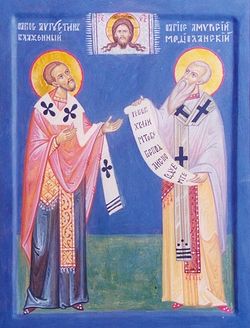“I sought Thee not—Thou didst seek me: I thank Thee, my Enlightener!”—thus one of the most revered Western fathers of the Church—Blessed Augustine, the bishop of Hippo (354-430)—recalled his conversion. Brimming with wondrous sincerity and depth, these words were born of a heart fully acquainted with the depths of the fall and the pain of separation from its Creator.
The life of St. Augustine cannot but amaze. His path to God was so difficult and convoluted, with so many dark and sometimes even filthy sides that an inexperienced Christian might find the sanctity of this great servant of the Church questionable. Indeed, despite the fact that the mother of the saint, Blessed Monica, was a zealous Christian, striving to raise her son in the spirit of Christian teaching, the young Augustine did not really try to imitate her virtues. During his studies in Carthage, he led a licentious life in a circle of unbridled peers. His rule for life was “To love and be loved.” He entered into cohabitation with a woman, from which was born his only son. His first religious search led Augustine to Manicheism, which he confessed for ten years, drawing his friends into the heresy. Then there was Rome, a new cohabitation, philosophical searches for happiness, subverting every thought, skepticism, and much more… Later, in his famous Confessions, Blessed Augustine recalled this period: “I left Thee and arrived at the abyss of infidelity, at the deceptive gratification of demons, to whom I offered my evil deeds in sacrifice.”
But still, there was something special in the saint’s difficult path in life—something his heart had only rarely touched, and his mind so persistently rejected. Blessed Augustine himself testified to this, addressing God with the words, “Thou wast in me deeper than my depths and higher than my heights.”
Borne out of the heart’s innermost recesses, this recognition is filled with amazing power and concerns the life of every Christian. It is the imprint of that Divine mystery which imperceptibly enters our lives, barely realized by man, working a true rebirth in him. This is the mystery of Divine silence…
If we hearken to the words of the confession of St. Augustine, we will notice many interesting things. It turns out that he demanded that his mother baptize him while he was still a youth, but the Lord left this childish zeal go unanswered. The Lord also did not answer the sincere tears of Augustine’s holy mother—Blessed Monica, for whom it was extremely painful to see the ruinous life of her beloved son. Of her zeal in this, the saint recalls: “I cannot express enough how she loved me; she bore me in her soul with much more worry than when she bore me in her body.” The Lord did not take pity on the holy sufferer even when Augustine, guided by vain aspirations, secretly left for Rome, leaving his mother weeping and praying for him. “What did she ask of Thee, O Lord, with such tears?” the saint later asked. “That Thou wouldst not allow me to sail away? Thou, in the depth of Thy councils, didst hear her main desire, did not take care for what she asked for then: May Thou ever make of me what she asked.”
Even those who, it would seem, certainly should have participated in helping Augustine’s heated nature to know the Truth, refused to interfere in his life. As if diverted by the unseen right hand of God, they were mysterious accomplices in the Creator’s silence. Thus, the bishop to whom St. Monica appealed with a tearful petition to speak with her son, fallen into the net of the Manicheans, firmly replied to her, “Leave him there and only pray for him to God… Go! As surely as you live, the son of such tears will not die.” St. Ambrose of Milan, to whom the Lord led St. Augustine, did not break God’s silence. As the saint himself testifies: “He didn’t know of my storms, or of the trap set for me. I couldn’t ask him what I wanted and how I wanted, because we were always separated by a crowd of busy people whom he was helping in their difficulties.” Although it seemed that the hour had finally come, when the great lamp of the Church, wonderworker, and virtuous ascetic should offer his restless soul to Christ, in this case, the Lord remained silent through His holy hierarch, and now the Lord was hesitating…
There was even a moment when Augustine himself was but one step away from the knowledge of the Truth; when he himself, convinced of the futility of any philosophy, confessed that Truth should be sought from Someone else. There remained so little—that the Creator would somehow reveal Himself, appearing to the one seeking Him. But even here the Lord remained silent, not revealing Himself, so that the saint later recalled about his approach to God: “Lord, God of truth, is the one who knows this already pleasing to Thee? Unhappy is the man who knows everything but knows Thee not; blessed is he who knows Thee, even though he knows nothing else.”
God’s silence was so clear that sometime later the saint himself was sincerely perplexed: “My Hope from my youth, where hast Thou been and where hast Thou gone?... I sought Thee outside myself and found not ‘the God of my heart,’ and went ‘even unto the depths of the sea,’ having lost faith and despaired of ever finding the truth.”
This bewilderment is understandable to anyone. After all, such moments often happen in our lives when we sincerely inquire of God and seek Him, hoping to understand His will, but… God does not answer us. We do not understand, we weep, we get angry, we grumble, we beg, but God is still silent.
This silence of the Creator very often seems terrible for man; he doesn’t understand it and is afraid. But there is something foreign for a Christian in such an attitude towards the silence of God. St. Augustine felt it, and therefore was able to answer the Creator’s silence: “To Thee be praise, to Thee be glory, Fountain of mercy. I became all the unhappier, and Thee all the closer.”
Yes, God can be silent, and it’s often a mystery for us. But our God gave Himself for our sake, and that means, His silence is filled with love; it means He has reasons to leave us without an answer to even our most sincere pleas to Him. And who knows, perhaps the Creator’s silence is in actually His last mercy to us, condemning ourselves by our own aspirations. We should not fear it, because our God is All-Good; He does not frighten us; He meekly loves His creation.
“Be not foolish, O my soul, nor become deaf in the ear of thine heart with the tumult of thy folly,” St. Augustine said to his own soul. And it was sincere. He truly performed a great podvig—hearing the silence of God, accepting it, and recognizing the greatest mercy of the Creator in it—and he thanked God that He did not give him to drown in the waves of his own nature: “I thought about it—and Thou wast with me; I sighed and Thou didst hear me; I was tossed about by waves and Thou didst guide me; I walked the broad worldly path, but Thou didst not leave me.”
The Lord lingers and is long-suffering, but this deliberation is always full of great love and compassion for man. Our God is a God of love. We must not forget this even in our most desperate moments, and the Lord will not leave our hope unanswered. Even when it seems there is no hope for salvation and circumstances are stronger than us, it is worth heeding: Perhaps Someone in our life is very close, wisely silent, waiting for a humble answer to His meek love.






